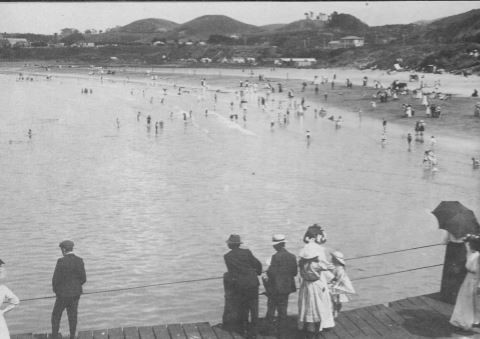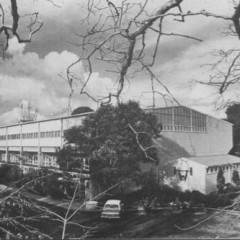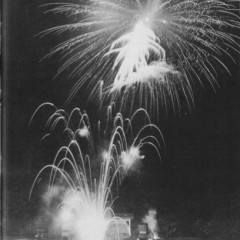11:2
Court records of the case disclose that after several adjournments, Brown was fined $10. This small fine did not find favour with the Maoris, and the recorder notes: 'Brown is bound over to keep the Peace for 12 months under the penalty of f1 00 ($200).7 Captain King continued to administer justice in the town until he retired in 1852 during a period which demanded of him the utmost discretion. The truculent behaviour of a section of Maoris was increas- ing and their frequent threats were successfully countered by the 70-year-old captain with the only possible effective weapon in' the absence of a more positive one-diplomacy. The strain told, and on July 1, 1852, Governor Grey appointed Josiah Flight to succeed him. Inter-racial conditions deteriorated in Taranaki and elsewhere, cul- minating in the assimilation of the little police force into the military in 1859, a position which was maintained until the Armed Constabulary Act of 1867. Police in the early days were called upon to perform many 'other duties'. In 1871 there were one police sergeant and two constables in New Plymouth. The sergeant, who received an annual salary of $240 'occupied the position of Sergeant-at-Arms in the Provincial Council; poundkeeper for the town; registrar of dogs; inspector of weights and measures (which had, since 1853 been the province of the local gaoler); and inspector of nuisances. The constables received £84 ($168) a year and acted as messengers to the Superintendent's Office and Provincial Council. '8 In 1877, with wars and war scares almost over, the Armed Constabul- ary was split into two branches-the' field force' , which was maintained for military purposes, but which was more often used for public works, such as road and bridge building; and the 'police force'-both still under command of military officers. The Police Force Act of 1886 established a national police force (still under military command until the first police commissioner was appointed in 1890), and from this time policemen were unarmed and carried out their duties in a community which, with a few exceptions, respected the law.
They had some unusual and often amusing police duties: 'Tamatu Watene, summoned to appear in New Plymouth on Tuesday for letting a bullock stray, said he would not be there on Tuesday as he was going to Inglewood; nor on Wednesday because his head would be aching; but he would be there on Thursday. The case was heard on Tuesday and Tamatu was fined;'? Perhaps the most ridiculous case ever held in New Plymouth was when a 'woman inebriate much the worse for a free-for-all fight, was brought to the Brougham Street Court in an express wagon, and the magistrate, to save the pain and trouble of carrying the woman upstairs, decided to hold court in the street. But the accused's voice could not be freed of its alcoholic paralysis, so off she went in the same express for a week's stay in Jail.'l0 Thomas Hickman, 'one of the smallest and smartest policemen in Taranaki', was one of many who joined the Armed Constabulary and was transferred to the New Plymouth branch of the police. He was one of the few who kept a personal diary .11. In his meticulous copperplate writing he recorded that while he was in charge of the Parihaka district, 'many Maoris were arrested for different reasons and brought by me to New Plymouth ... the chief, Te Whiti, was several times arrested for political reasons and contempt of court ... ' In August, 1893, the Taranaki Herald reported on one of the cases in which Te Whiti appeared, charged with bankruptcy. Seven years previously an Opunake merchant had been given judgment against Te Whiti for $270. The money was never paid, and when arrested after several warnings, Te Whiti said he was a novice in European ways and knew nothing of the law. In court he argued at great length that he possessed nothing; everything at Parihaka belonged to the community of which he was head. His reasoning was apparently successful, for the judge told him he could go home. Te Whiti then suggested that the court, since it had brought him, should take him home. His final comment: 'If! am in the wrong I should be punished, and if the court is in the wrong it should be punished.' The judge's comment, if there was one, was probably unheard over laughter in the court. Hickman records that he arrested 'a native named Enoka who had murdered his wife.' Enoka was a full-blooded Maori of noble birth, aged 23, who was well educated and spoke English fluently. His wife, with whom he had quarrelled, was found 'frightfully cut about the head as if with an axe'. After a four-day trial he was sentenced to death and was hanged in New Plymouth prison in March, 1898. In a tribute to Hickman, Inspector McGovern, officer in charge of the Taranaki police district, recommended promotion and a monetary reward f or his services in this case. He referred to the 'laudable tact, energy and perserverance displayed by No. 504 2nd Constable Thomas Hickman' which 'saved the department endless time, trouble and expense ... he succeeded in holding a post-mortem and inquest on the body of the murdered woman before the natives could realise what was going on.
The Maori have great horror of doctors or persons interfering with their dead, and Te Whiti and Tohu are both very averse to any European law coming within the range of Parihaka. They were much annoyed that his people did not inform him about the inquest and the European inhabitants throughout the district were astonished when they learnt that one had been held there. The amount oftrouble and anxiety that Constable Hickman has gone through in keeping the witnesses together and obtaining evidence until the case was brought to a successful issue was beyond description ... ' There is no record in Hickman's diary of his receiving either promotion or a monetary reward. He had served 43 years in the police on his retirement in 1911 and he died in 1930 at his Lemon Street home. Growth of the New Plymouth police has kept pace with that of the town and its changing social conditions. From a sergeant and two constables in 1871 there was, in 1980, a staff of 80 under police superintendent Richard Newman, which included a criminal investiga- tion branch, armed offenders and drug squads, dog handlers; mobile units equipped with two-way radio, and administrative and clerical workers. Among the 80 were four policewomen. The first police station was on the slopes of Mt Eliot, but when this was levelled a new station (shown on a map drawn in 1880 by T. Kingwell Skinner) was built on the corner of Robe and Powderham Streets near the present courthouse. By the 1960s these premises had become too cramped for the increasing number which moved across the road into the present three-storey headquarters.
Mt Egmont and its ranges have always attracted climbers and trampers. (Dr Ernst Dieffenbach, the New Zealand Company's naturalist, made the first recorded European ascent of Egmont in the summer of 1839-40.)12 It is a deceptive area and many have been trapped through accident or inexperience. Among police ranks there have always been men with mountaineering and rescue skills and over recent years a Search and Rescue Organisation under police control has developed highly efficient operational procedures. Between 1935 and 1980 there were I I I search and rescue operations involving 328 people in trouble on Egmont and the backcountry. Backbone of all search parties are the many climbing and tramping clubs and' search' calls are invariably responded to with enthusiasm. Closer to home is Paritutu, the' Sugar Loaf which, with the power station, dominates the city's western skyline. At first glance it seems a comparatively easy climb, but the treacherous loose surface becomes a trap for the inexperienced, and there have been several sensational rescues from this rock. Notable among them are those in which Constable Ray Petrowski took part. Petrowski, although not a climber, was stationed at the Moturoa police station (since closed), and between 19'51 and 1978 rescued eight people trapped on Paritutu, for which he was awarded the British Empire Medal, the Royal Humane Society's Bronze Medal, and several police commendations. The building of the power station effectively sealed off the seaward side of the rock, and there have been few incidents since 1978. From the landward side there is a well-formed track to the summit. But there are risks and some years ago the city council gave a large amount of copper cable from the dismantled overhead trolley bus wires to make the track safer. The Taranaki Alpine Club secured the cable to steel stanchions driven into the rock. Overnight the cable disappeared.
New Plymouth's first prison was a tiny cabin, which was replaced in 1842 by a slightly larger boarded structure without a floor, on the eastern slopes of Mount Eliot near the police stati,on. It lasted only a few months; four or five drunken whalers and sailors were herded into this jail, but it took only a concerted effort to upset the building, 'the prisoners each going his own way' .14 Stocks were erected in the same locality. This primitive custom was abandoned in 1845 when a stone lock-up consisting of two small dungeons 'almost without light and ventilation' and a small exercise yard was built in James Lane, off Devon Street, at a cost of $53.30. Before long this was being criticised on many grounds: It was almost in the centre of the growing town and often the noise made by the inmates was unbearable; it was a fire risk to all the wooden buildings surrounding it (when a fire in the jail in 1857 was investigated it was found that two debtors held there had been given permission to light fires to keep warm); it was a health risk-the beach stones of its construction were always damp--and even though it had been hailed as 'the strongest stone gaol in New Zealand,' escapes were frequent. In 1857 the central government offered $4000 for the erection of a courthouse and a new prison. The courthouse was built but no prison. In December, 1858, two soldiers of the 65th Regiment stationed on Marsland Hill, William Lucas and Thomas Jones, were brought to trial charged with burglary and the rape of a 74-year old widow, Mary Ashton. The case was heard by Chief Justice Arney before a grand jury , and lasted for three days. After deliberating for 15 minutes the jury brought in a verdict of guilty. The judge told the prisoners that but for the recommendation of the jury that their long imprisonment should be taken into consideration, he should have felt it his duty to condemn them to penal servitude for life for a crime 'which but a few years since, could have sent them to the scaffold'. The men were sentenced to 15 years penal servitude.


